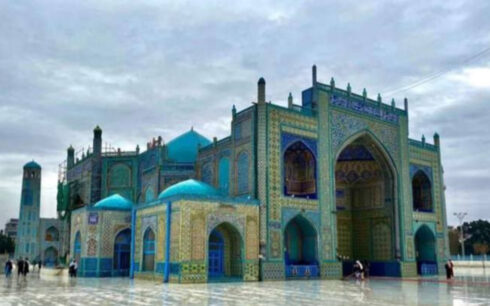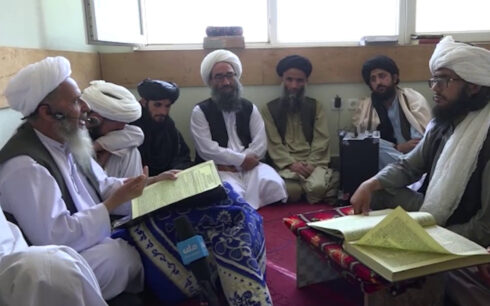The Atlantic Council’s Strategic Litigation Project, together with the Global Justice Center, has called on the international community to codify the crime of gender apartheid in the UN’s Crimes Against Humanity Treaty.
The letter and legal brief, sent on Thursday, October 5, were also endorsed by dozens of prominent jurists, scholars, and civil society representatives from around the world.
Calls for codifying gender apartheid have gathered momentum in the past few months amid ongoing and increasing edicts and decrees against women in Afghanistan who have all but been erased from public life in the past two years under Taliban rule.
Gissou Nia, the founder and director of the Strategic Litigation Project at the Atlantic Council and advisor to the End Gender Apartheid Campaign, said in an article on the council’s website that “gender apartheid is a horror,” and that “now the United Nations can make it a crime against humanity.”
Next week, the United Nations’ legal committee will meet to debate its draft treaty on crimes against humanity. When it does so, “it must include one of the most brutal and society-stunting crimes in the world today: the crime of gender apartheid,” Nia said.
Over the past two months, the term gender apartheid has been coined by multiple organizations and individuals in relation to the Taliban’s policies against women in Afghanistan.
But what exactly is gender apartheid?
As explained by Nia, gender apartheid occurs when perpetrators seek to maintain a form of governance designed to systematically oppress and dominate another gender group or groups so that the dominant group may live alongside them and benefit from their subjugation.
“In Afghanistan, gender apartheid is seen in the Taliban banning women and girls from education and almost all employment, and from traveling long distances without a male guardian, all while having to abide by a severe dress code. Women in Afghanistan are banned from almost all public spaces including public parks, gyms, and most recently beauty salons,” she said.
Iran also imposes a form of gender apartheid, Nia said, adding that an Iranian woman does not have the right to divorce her husband or to gain custody of her children. They are also banned from obtaining a passport and traveling outside the country without the permission of a male guardian. They are also banned from many fields of study and are not allowed into sports stadiums.
“Gender apartheid in these countries is seen in a series of policies and daily abuses that bar women and girls from engaging in public life and having hopes of any financial autonomy. It is in all these measures designed and enacted by the Taliban and the Islamic Republic [of Iran] as a system of governance that aims to compress and relegate Afghan and Iranian women and girls into narrow roles: as child-bearers, child-rearers, and sources of unremunerated domestic labor,” Nia said.
Despite not ever having been codified under international law, gender apartheid has long been recognized as a concept, dating back to the Taliban’s first time in power in Afghanistan during the late 1990s.
The letter sent to the UN member states on Thursday has defined the crime of gender apartheid as “the commission of inhuman acts with the intent to maintain an institutionalized regime of systematic oppression and domination of one gender group over another,” Nia stated.
She explained that this “amends the existing definition of the crime of race-based apartheid under the Rome Statute—the animating document of the International Criminal Court—to encompass the same act and mental element, but with regard to domination of gender groups rather than racial groups.”
Nia stated that should the crime of gender apartheid be codified, it would give victims and survivors a clear legal avenue to hold perpetrators – state or individual – to account for the crimes being perpetrated against them.
“As these regimes continue to tighten their grip, aiming to entrench a system of governance that eviscerates any semblance of women and girls’ autonomy” every available option is needed to prevent and punish the full scale of their conduct, she said adding: “Codifying gender apartheid would equip the international community with a new and powerful tool for accountability to mobilize against these deteriorating situations.”
The campaign to codify gender apartheid is built on a long history of work and over the last year, UN Secretary-General António Guterres and other UN experts specifically recognized the deteriorating situation for women and girls in Afghanistan, terming it gender apartheid. Just last month the UN Women’s Executive Director Sima Bahous called on the international community to explicitly codify gender apartheid under international law.
Nia said the letter issued to UN member states urges them to amend the draft definition of the crime of apartheid to encompass gender-based apartheid.
According to her, accountability against governmental actors in Afghanistan has been tough but that the proposed codification would open new avenues to hold perpetrators to account.
“If the crimes against humanity treaty is adopted and the crime of gender apartheid is included, countries that are party to the treaty would be obligated to criminalize gender apartheid and take other measures to prevent and punish crimes against humanity under their domestic laws,” she said.
The letter and legal brief, sent on Thursday, October 5, were endorsed by dozens of prominent jurists, scholars, and civil society representatives, including Afghanistan’s women’s rights defender Shaharzad Akbar and Nobel laureates Shirin Ebadi, Malala Yousafzai, and Nadia Murad along with numerous key rights advocates such as South African jurists Justice Richard Goldstone and Navi Pillay, former US Secretary of State Hillary Clinton, former Irish President Mary Robinson, former International Criminal Court Chief Prosecutor Fatou Bensouda, and renowned global feminist Gloria Steinem.





